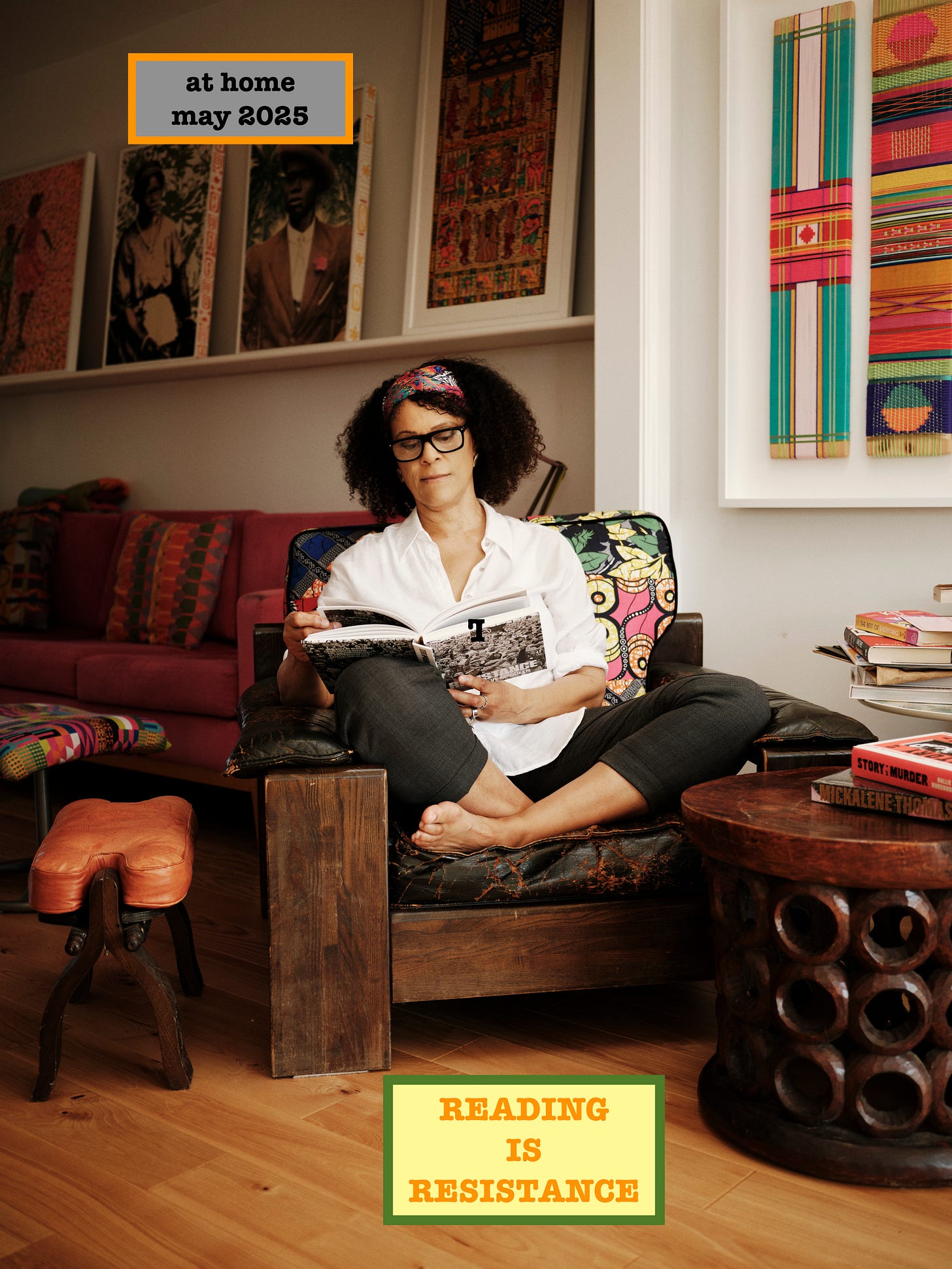Reading is Resistance
Reading 'Resistance' edited by Steve McQueen
Photo by Robinson Barbosa.
Important message. I want to inform everyone that I’ve had a change of heart and I will no longer be taking payments for my Substack. I’ve been using it for two weeks now and have gained nearly 1000 subscribers in total, paid and unpaid, but there is a commitment to post weekly for paid subscribers, and I realise I can’t do this when I am so busy. I’d rather suspend payments until I have the time to commit and also work out how to most effectively use this platform. (It’s quite overwhelming and complicated for a newbie.) Of course, I might just post frequently anyway, but most importantly, I won’t feel pressured to do so. I think suspending payments takes a couple of weeks to kick into action via the Substack payments’ system. If anyone wants a refund, let me know in Chat.
So - this photograph is from a photoshoot at my house in May. I’m seen reading the book, Resistance: How Protest Shaped Britain and Photography Shaped Protest, compiled and edited by the filmmaker and artist, (Sir) Steve McQueen*. It’s very timely, especially right now when even the right to peaceful protest is being shut down by the British Government
Resistance takes many forms: public protest is important but so too is navigating the power structures to make a difference from within, which is often misunderstood. Resistance cannot always be made public - so why do we judge others when we cannot see what they do? On social media, there is a trend of outspoken people calling each other out - their peers, their community - for not posting about world events on social media, as if this is the only protest that counts, or even the most important form of protest. It’s as if those in their community who do not share the same MO around protest are the enemy and not the actual perpetrators. And yes, sometimes it does feel performative in these echo chambers unpenetrated by anyone outside the ‘group’. We need people on the inside who will advocate, support and fight for those on the outside, as well as those who quietly, financially support the organisations most in need. I’m not saying there is no place for very visibly kicking up some noise on social media, but not everyone can or wants to adopt the same strategy. It doesn’t mean they are not actively activist, or that they are uncaring, cowards or quislings.
Resistance, the book, has a characteristically brilliant introduction by top journalist, Gary Younge. He ends with, ‘We do not know what the next century will bring, how those traditions will develop, what concessions will be made by the powerful or what space they will seek to reclaim. The only thing we can say for certain is that so long as there is inequality, injustice of plunder, there will be oil on the ground - and there is always a spark somewhere.’
It’s divided into chapters on different protest issues, with essays from great thinkers such as Stella Dadzie, Paul Gilroy and Baroness Chakrabati. It’s also an attractive, hardback object - a visual delight with many black and white photographs bringing the past alive - including of the Suffragettes in the first years of the twentieth century. There was an exhibition of the photographs in the book at the Turner Gallery in Margate, which I went to see a few months ago.
Reading is resistance - through literature we educate ourselves against ignorance and the dumbing down of our society; we engage with the world beyond our own lives, therefore expanding our knowledge base beyond the typically dominant narratives and our personal stories; we deepen our understanding of what it means to be human and learn from different perspectives; and we develop the linguistic skills with which we can express ourselves. We cannot underestimate the power and privilege of being articulate. In today’s society, when our brains are being rewired to substitute scrolling for reading - both involve the eyes - the reader of books has the advantage.
2026 has just been announced as the National Year of Reading with the Government and National Literacy Trust. See my Instagram post of July 21st to see more on this. Check out their statistics on the decline in reading via their website and see if you can get involved in your own way - or with them - especially if you are in a position to cultivate reading for pleasure in children. https://literacytrust.org.uk/
*He made the films, Hunger, Shame, 12 Years a Slave, Widows, Blitz, Grenfell - and as a visual artist he won the Turner Prize in 1999



As a former librarian it’s great to hear 2026 will be the National Year of Reading. It’s greatly underestimated how important it is for parents to model a reading culture at home, especially for boys, who for myriad reasons are even more reluctant to pick up a book. Thanks for generously allowing free access to your newsletter.
Thank you Bernadine for treating us all to access to your work, I really value it, and you. Loved this article and affirming that reading is resistance. I will continue to gobble up stories and literature and will definitely support the young readers, and also will check out Resistance - thank you for the recommendation.